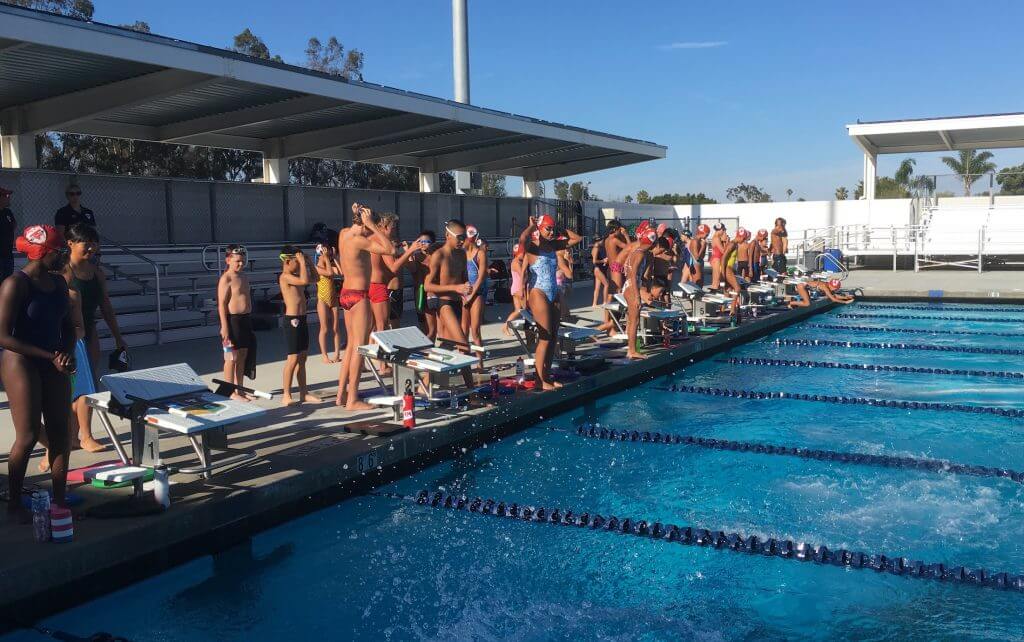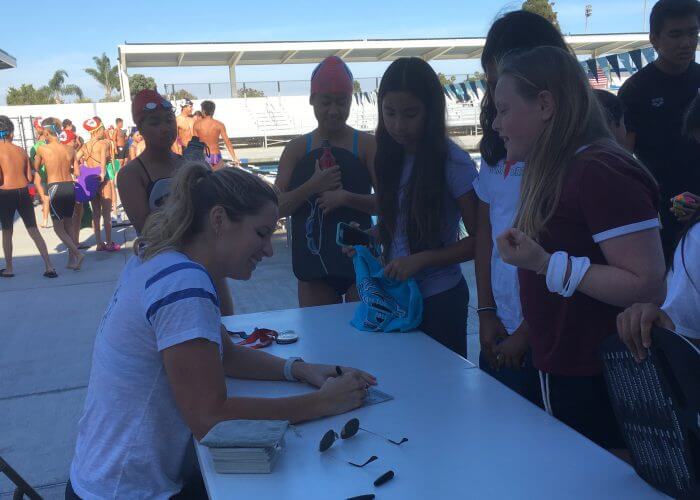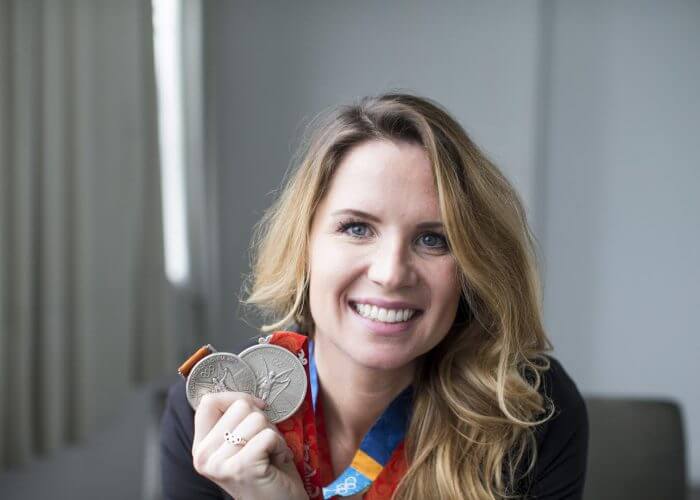Olympian Kara Lynn Joyce Continues to Give Back to Swimming

TORRANCE, CA. It was a typically stunning Southern California day, causing a large crowd of young swimmers to cluster in the Torrance Aquatics Center’s shaded bleachers. They listened attentively as a tall, athletic woman spoke about her challenges and accomplishment in one of American sports’ most competitive endeavors: swimming.
Kara Lynn Joyce, who qualified for three Olympics and collected four silver medals in the 4×100-meter freestyle and the 4×100-meter medley relays, addressed approximately 100 members of the Swim Torrance club about her experiences at the 2004, 2008 and 2012 Games, and what led to her phenomenal success.
It was all in a day’s work for Joyce, who continues to give back to her sport since retiring from competitive swimming following the London Olympics. Active in a number of philanthropic endeavors, including Play Like a Girl, a non-profit that encourages girls to unleash their full potential through physical activity, Joyce was featured in “Touch the Wall,” a 2016 documentary about the journey she and Missy Franklin took to qualify for London. She is also the founder of the Lead Sports Summit, which gives teenage girls who swim the tools to hone their skills as athletes. LEAD—short for Leadership, Empowerment, & Athletic Development—instructs these young women about how they can come together as a team, lean on each other—and lead together.
After signing numerous autographs and posing with a couple of her silver medals, Joyce spoke with Swimming World about her success, her efforts to inspire young athletes and the importance of LEAD in supporting teenagers as they develop as athletes and people.
– Three Olympics plus four Silvers equals a lot of success.
I feel very fortunate to have the career that I did. I went to my first games when I was 18 and my last games when I was 26. Now, I’m seven years removed from 2012. It’s one of those things that you appreciate more as time goes on.
When you’re in it and you’re still working towards your goals, you don’t really bask in the glow of your accomplishments. I feel very lucky to have gone one time, and then to end my career the way it did was really special. It’s purely because of so many great people who came into my life and supported me.

Kara Lynn Joyce shows her young fans some love. Photo Courtesy: M. Randazzo
Being able to come around and do things like this— I remember meeting my first Olympian, I remember meeting every great swimmer that reinforced the goals and the dreams that I had. I realized they weren’t crazy… and [that] Olympians are just normal people too, who do cool things.
– You’re committed to inspiring young swimmers to pursue their dreams in and out of the pool.
To me, it’s not about making the Olympics or winning an NCAA title. [It’s about] pursuing your dreams, your goals and being part of something that’s bigger than you. This is just the avenue that these kids have chosen to learn more about themselves and to better themselves.
You take that as far as you can and… especially for sports in general, it gives you back so much. Way more than you even realize.
It’s more than accolades and medals. It’s about relationship-building and team-building. And humbling yourself and working towards a common goal. All of those things together—they are important after you hang up your googles for the last time.
– You went to Pioneer High School in Ann Arbor—right around the same time as Betsey Armstrong, who won gold with the U.S. Women’s Team in the 2012 Olympics, was going to Huron High School.
I’ve met Betsey before—my high school’s across the parking lot from Michigan! I’m aware of how incredible Betsey is. Michigan is really good at water polo. I moved to Michigan from New York, where it wasn’t on the radar at all. One of the girls on my high school swim team—Alison Gregorka—went on to make the 2008 Olympic team.
I love following the women’s water polo team. I think it’s so great when other women support other female sports and get behind it.
It’s a great community to be a part of—not just the women’s swimming community but the female athlete community.
– You’ve taken all the positive lesson you’ve learned from life and athletics and put this into LEAD.
I started LEAD about three years ago, so we’re coming up on our third summit. We host a yearly event and it’s just for teenage girl swimmers to focus on leadership, confidence, nutrition, sports psychology [and] mental health.

Joyce posing with part of her Olympic booty. Photo Courtesy: Taylor Baucom/The Players’ Tribune
We bring in specialists from all those fields as well as a handful of female Olympians.
For four days we have 150 girls and a dozen different speakers who give keynotes and run breakout groups, where the participants really get to have intimate time with the girls. And to help them better themselves.
It’s really not your typical swim camp; over four days we have one two-hour session in the water. It’s a clinic that the girls get to have fun with. [The LEAD summit] is about all the other tools that as an athlete doesn’t involve actually getting in the water. It’s not your kick, it’s not your body position. It’s your mental strength, your confidence—empowering you with more knowledge.
The more tools in the toolbox, the better decisions you’ll be able to make—whether that’s to help you overcome pre-race anxiety or the information needed for your body to feel the absolute best it can so that you can have the performance that you work hard for.
LEAD isn’t about making 150 girls 150 Olympians, it’s about helping these girls be the best athletes they can be. But also, learn the tools that you need as an athlete to carry yourself as a great young woman and be part of your community and your friend group.
It’s my passion and it’s impacted me in a way that I never anticipated. “One teaches; two learn;” I feel like I’ve learned so much form the girls and I feel very lucky to have this in my life.




A great petson
Stacy Skeen Kirkpatrick Jill Massie-Braun Karen Thor Bland